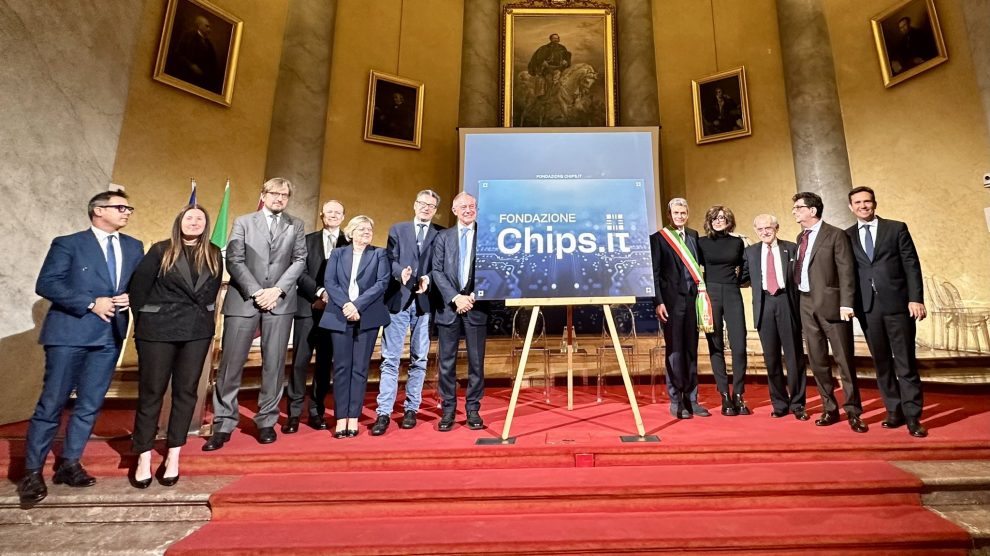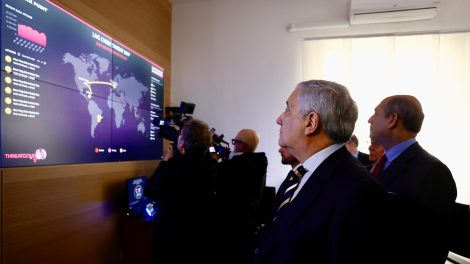Government unveils new Italian chip design centre. The Chips.IT Foundation was set up at the University of Pavia last week. The Ministers for the Economy, Enterprise and University – Giancarlo Giorgetti, Adolfo Urso and Anna Maria Bernini – attended the ribbon-cutting ceremony, highlighting the Italian government’s attention towards a sector that’s so strategic for both Italy and Europe.
- The Foundation is “a fundamental part of the new Italian strategy for microelectronics,” read a communiqué from the executive, which allocated €730 million to boost research and development in the Italian semiconductor sector back in August.
It counts towards the EU strategy. The Enterprise Minister is expected to announce a National Microelectronics Plan within the framework of the EU’s own Chips Act, which seeks to mobilise €43 billion to bring chip production back to the Old Continent. Along this incredibly complex supply chain, Chips.IT is supposed to act as an Italian excellence chip design centre as well as a “vehicle to seize the opportunities of the European Chips Act pillar dedicated to development and technology transfer,” remarked Minister Giorgetti.
- Minister Urso hinted that the Foundation is a “fundamental step” towards the upcoming national plan, which is “strategic” for the Italian economy both nationally and geopolitically. “We want to support Italian companies and attract foreign investment to our country, which is increasingly becoming an important ecosystem in the sector.”
In practice: Chips.IT will coordinate research and design activities with public and private players, provide state-of-the-art equipment and software, and act as a centre of excellence to help train new generations of talent in the sector. The government chose Pavia as the ideal site, as the Northern Italian city (not far from Milan) is “at the centre of an emerging ecosystem of semiconductor companies and academic excellence.”
- The government’s note also reveals that several private companies have expressed their intention to participate, through partnerships, in the Foundation’s activities. The list includes Analog Devices, Infineon, Intel, Inventvm, NXP, PSMC, Sony and STMicroelectronics.
The staff. The Foundation will be chaired by Alberto Sangiovanni-Vincentelli, Professor Emeritus at the University of Berkeley and an undisputed authority on semiconductors. Its Board of Directors includes Francesco Salvo, Rector of the University of Pavia; Luca de Angelis, an IT and telecommunications expert; and Enrico Sangiorgi, former Pro-Rector of the University of Bologna, advisor to the Meloni government as head of the chips task force set up within the University Ministry and member of the Board of Directors of the Cassa dei Risparmi di Forlì Foundation.
Italy’s unexpected chip prowess. Patents show that Italian academic efforts on semiconductors have been steadily climbing in the past years. The country is “already a world leader,” remarked Minister Bernini, while noting the challenges of “maintaining and strengthening this leadership.” This will only be possible through linking personal skills via synergy between universities, research centres and companies, she stressed, guaranteeing that the government intends to facilitate the creation of a chip ecosystem, with Pavia at its centre, to attract talent from across the world.
- The country remains competitive in the rapidly evolving sector of chipmaking, said Minister Urso, pointing at design expertise and advantages in new materials such as silicon carbide and gallium nitride.
- That’s also backed by a “very strong manufacturing expertise in industrial, automotive and aerospace applications, as well as excellence in the machine and test sector,” where an Italian company – Technoprobe – is a world leader.
Image: @BerniniAM on X





